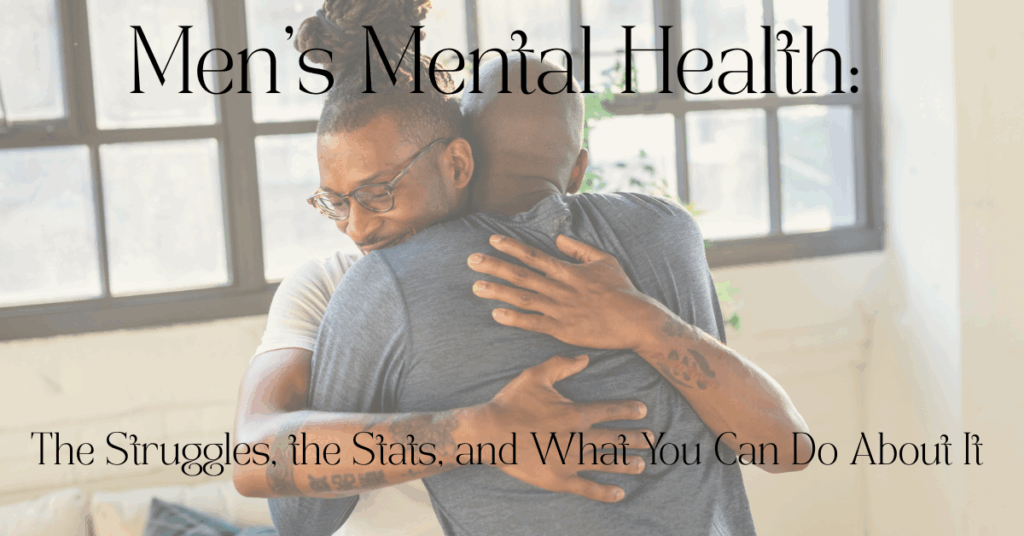Men’s Mental Health Awareness Month gives us a time to shine a light on the often-unseen battles men face and the unique barriers that keep them from getting the support they deserve. Though mental health affects everyone, men often struggle in silence due to societal norms, stigma, and internalized pressure to appear strong. It’s time we change the narrative.
This article dives into the realities of men’s mental health: what the data shows, what men are up against emotionally, and how we can start building a more supportive world for men to heal, grow, and thrive.
The Hidden Struggles Men Face
While every person faces mental health challenges, men are more likely to suppress or ignore their emotional struggles. Culturally, men are often taught from a young age to be stoic, to avoid vulnerability, and to equate strength with silence. As a result, emotional pain is often masked with anger, substance use, workaholism, or withdrawal.
Common emotional struggles that disproportionately affect men include:
- Depression that may show up as irritability or numbness rather than sadness
- Anxiety hidden behind perfectionism or over-controlling behavior
- Anger and aggression as a substitute for sadness or fear
- Addiction as a coping mechanism for emotional pain
- Loneliness due to lack of emotional intimacy in relationships
Without healthy coping tools or permission to express what they feel, many men suffer in silence. This silence, unfortunately, can have deadly consequences.
The Statistics Speak Loudly
The numbers around men’s mental health tell a sobering story:
- Men die by suicide nearly four times more often than women in the U.S. (CDC)
- Depression is significantly underdiagnosed in men, in part because symptoms often look different, and men are less likely to seek help.
- Men make up 75% of suicide deaths, and middle-aged white men have the highest suicide rate.
- Men are more likely to engage in substance abuse, often using drugs or alcohol to manage unaddressed emotional pain.
These statistics aren’t just numbers—they reflect real people, families, and communities impacted by untreated mental health issues. The silence isn’t working. It’s time for a new approach.
Breaking Through the Barriers
Men face several barriers to accessing mental health support, including:
- Cultural expectations that label emotional expression as weak
- Fear of being judged or misunderstood by peers, partners, or providers
- Lack of representation in therapy spaces that feel more oriented toward women
- Financial or time constraints that make consistent support feel impossible
To break through these barriers, we need to normalize mental health conversations among men. This includes:
- Challenging toxic masculinity and expanding what it means to be strong
- Creating safe, judgment-free spaces where men can speak openly
- Promoting diverse therapists and counselors who are trained to engage with men’s unique needs
- Encouraging peer support in workplaces, families, and faith communities
What You Can Do to Support Men’s Mental Health
Whether you’re a man yourself or someone who cares about one, here are meaningful ways to support men’s mental health:
- Talk about it. Bring mental health into everyday conversations. Normalize checking in emotionally.
- Model emotional honesty. Share your own struggles in appropriate ways. Vulnerability invites vulnerability.
- Encourage professional help. Therapy isn’t weakness—it’s training for the mind, just like the gym is for the body.
- Respect privacy and pace. Some men need time and space to open up. Don’t rush, but keep the door open.
- Support holistic well-being. Mental health is deeply tied to sleep, nutrition, exercise, and purpose. Encourage balance.
- Be present without pressure. Simply showing up—without an agenda—is sometimes the most powerful support.
What Healing Can Look Like for Men
Healing doesn’t mean becoming someone new. It means becoming more fully yourself. For men, this might include:
- Learning to name and express emotions
- Setting boundaries that honor personal limits
- Reconnecting with purpose beyond work or performance
- Rebuilding relationships based on authenticity and mutual care
Therapy can offer men a unique space to unpack grief, anger, stress, trauma, or the weight of unspoken expectations. Group work, faith-based support, mentorship, and creative outlets can also foster healing.
When men get support, everyone benefits—partners, children, communities, and future generations. Ending stigma is not just a men’s issue. It’s a collective one.
Final Thought: Silence Isn’t Strength
The bravest thing a man can do is speak his truth. Not through rage, not through withdrawal, but through honest conversation, accountability, and connection.
As we honor Men’s Mental Health Month, let’s commit to listening better, supporting more fully, and showing up with compassion. You don’t have to hold it all alone. Healing is possible—and help is here.
At Refinery Counseling, we honor the full emotional experience of men. Whether you’re seeking therapy for the first time or returning to care, we’re here to walk with you.

